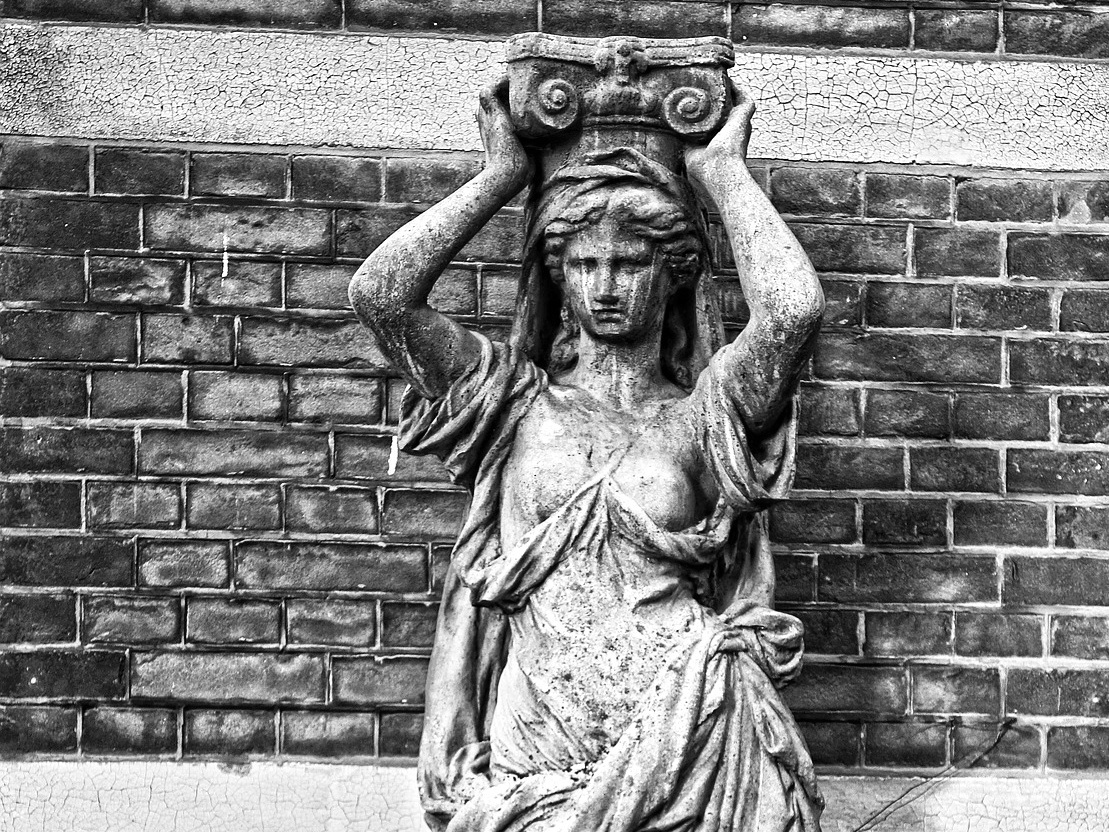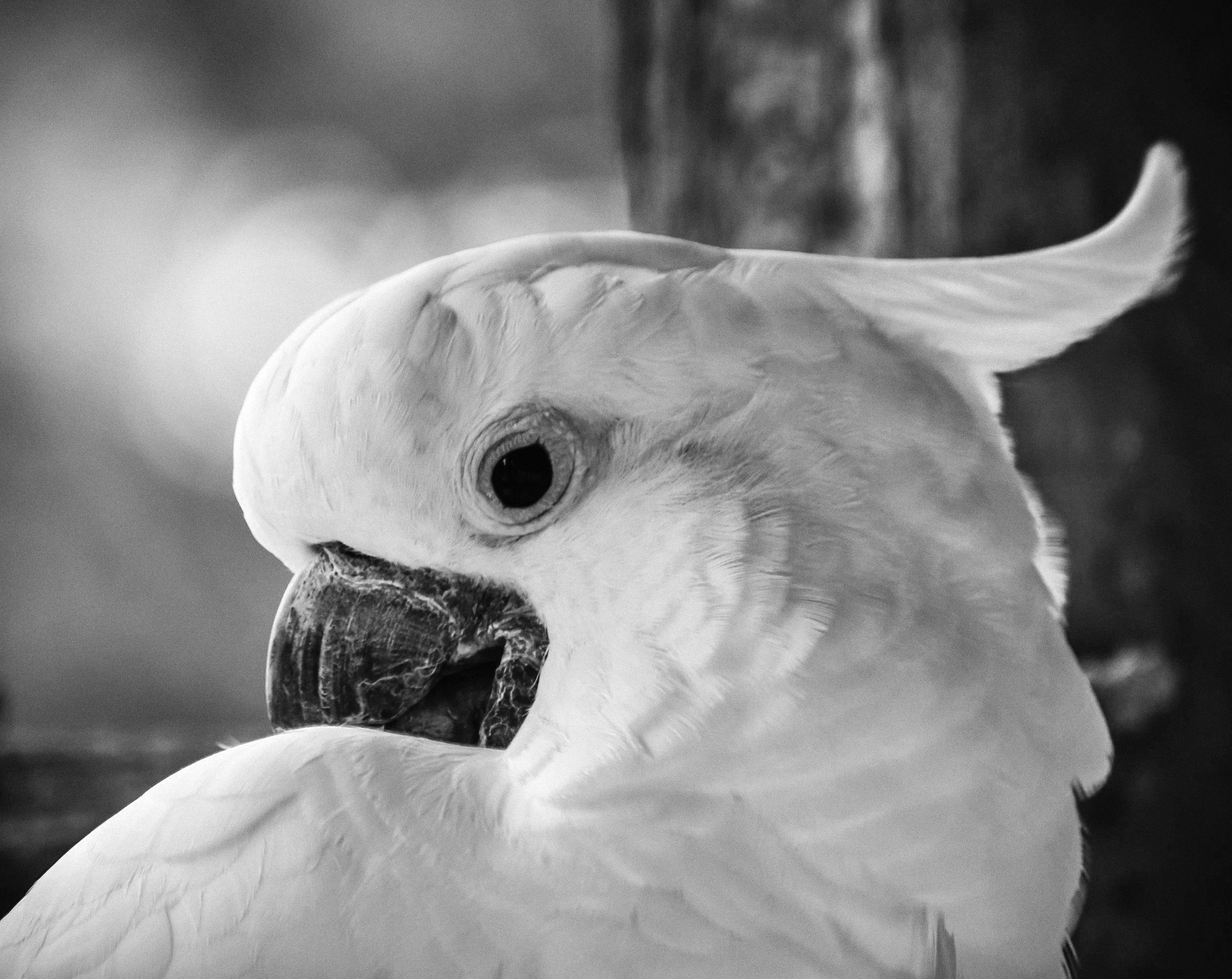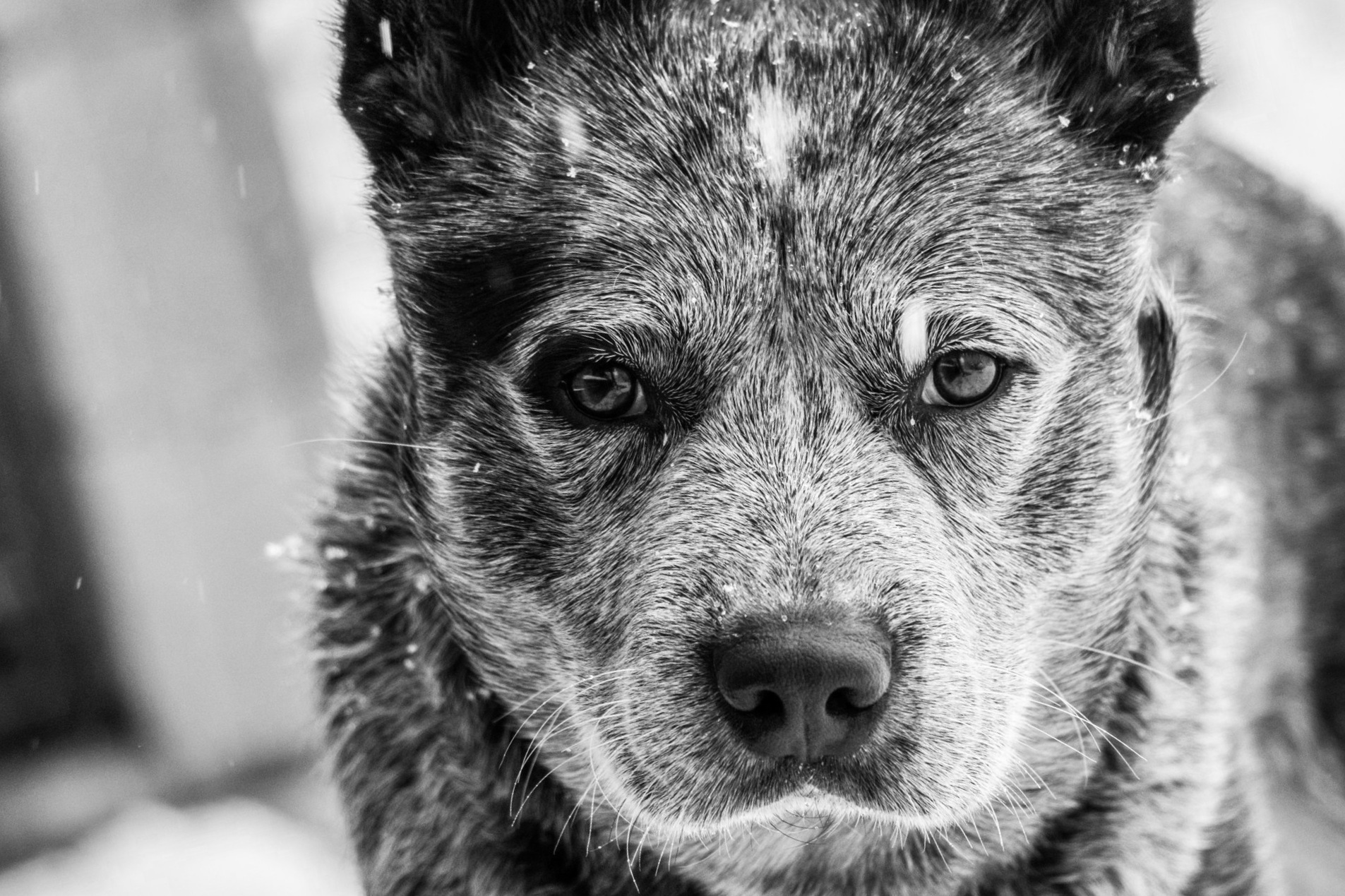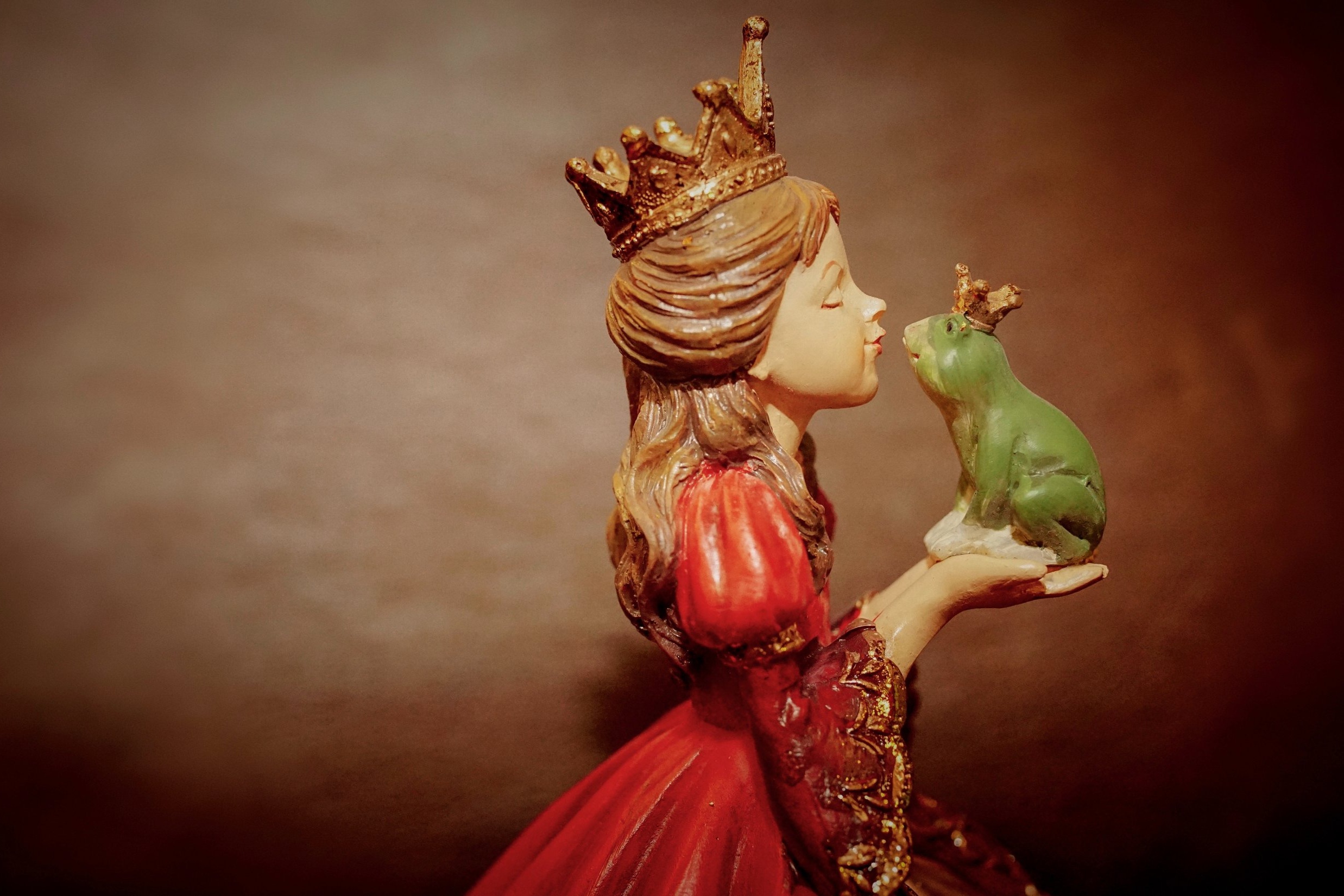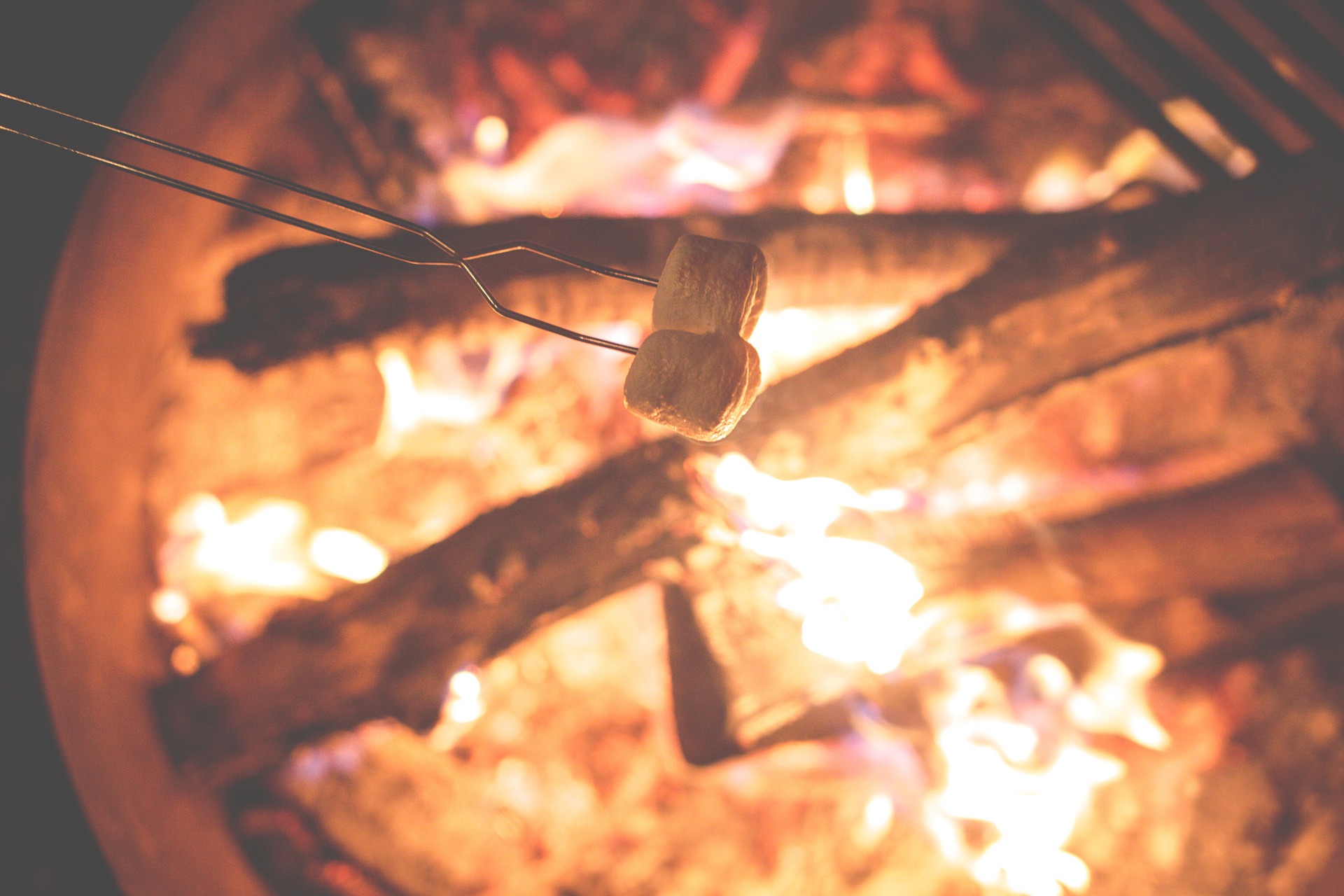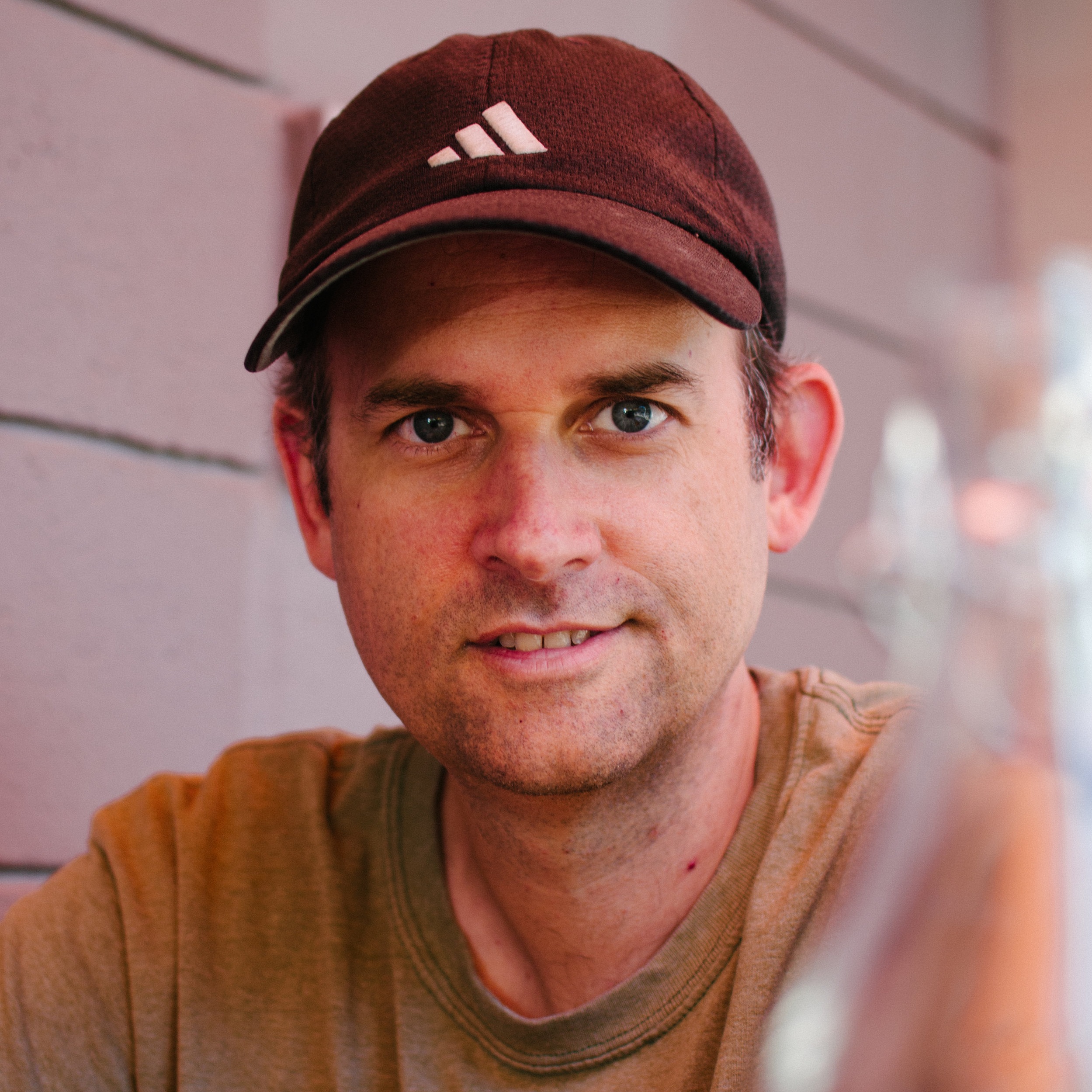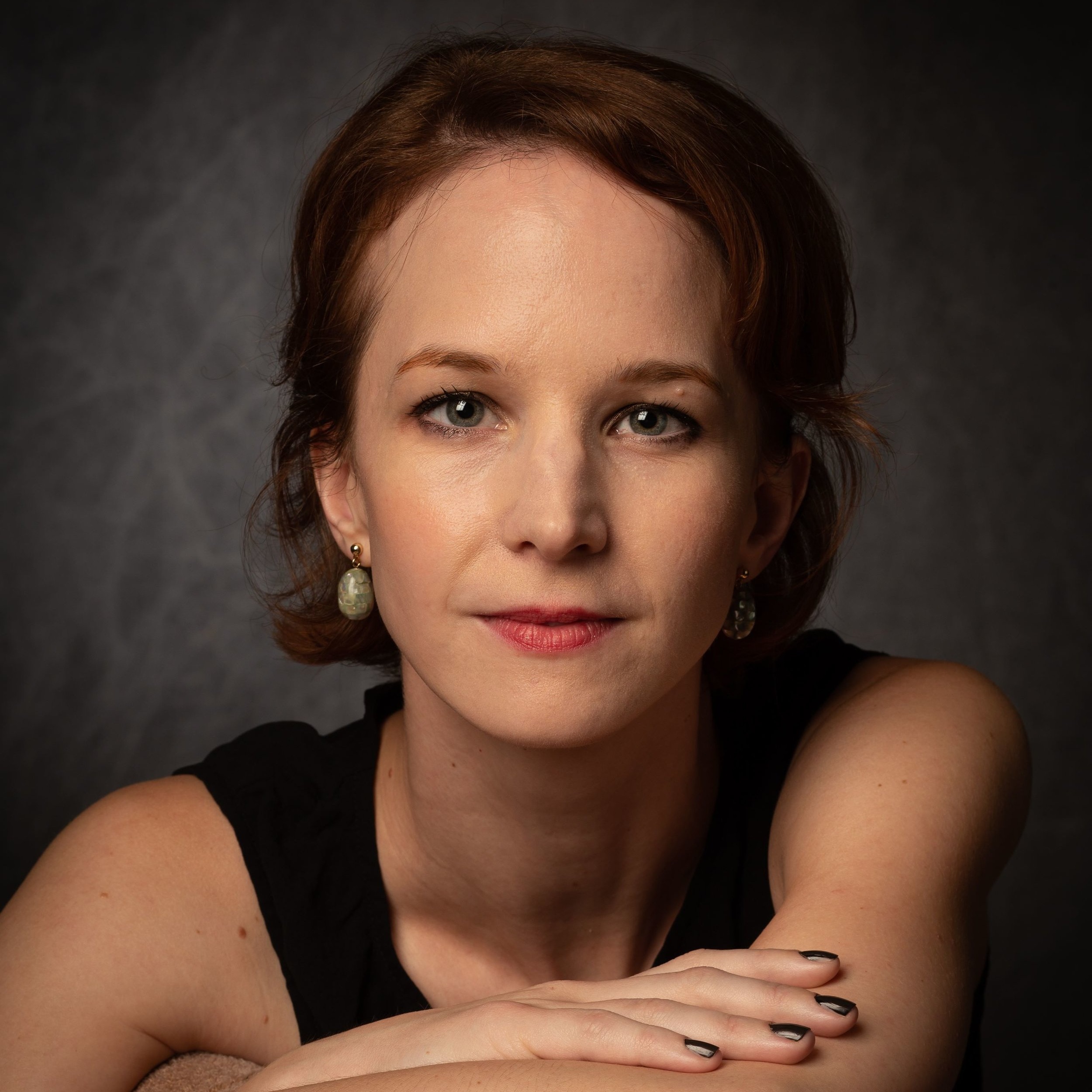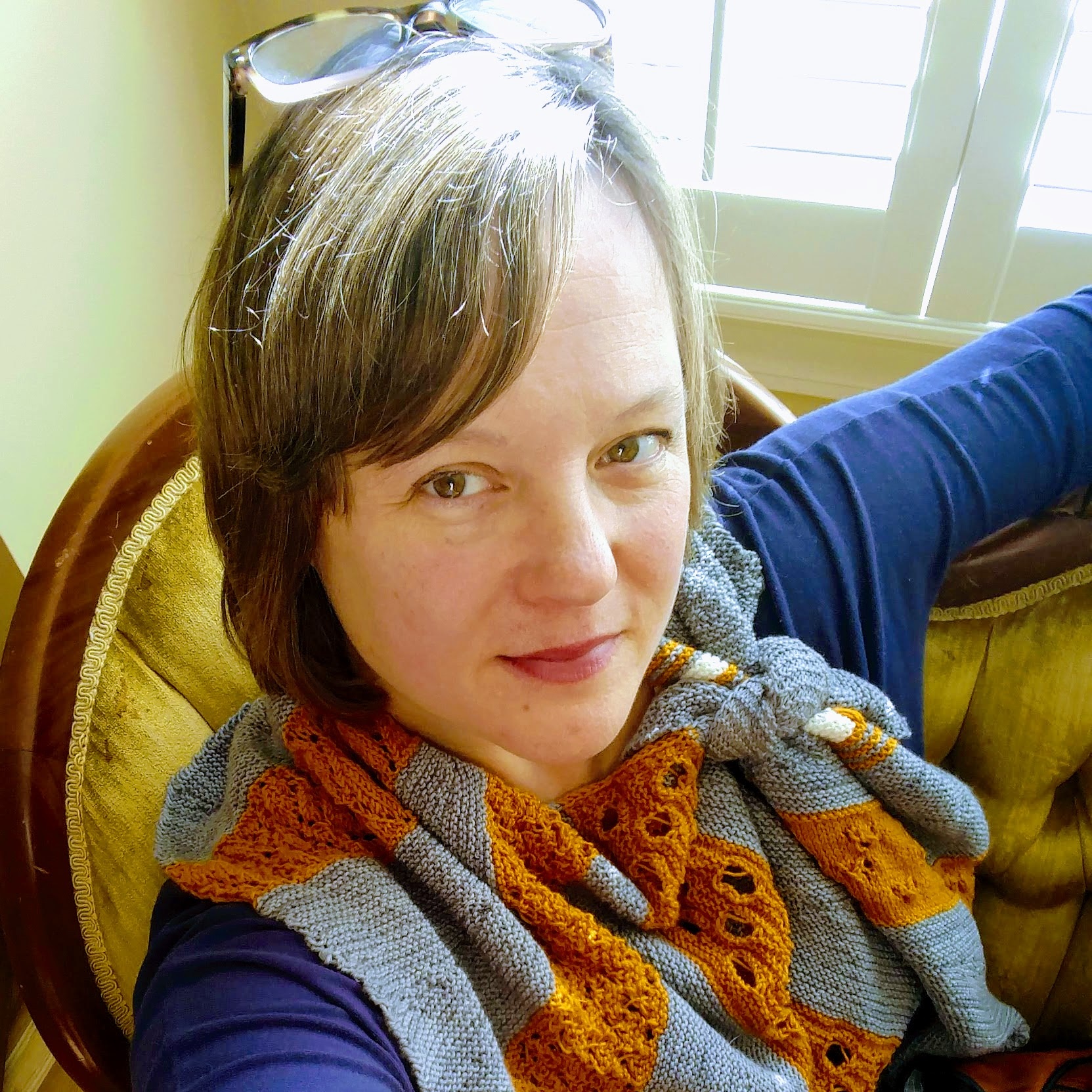Stumbling into Babylon
Chris Kassel
In the ICU, eight bays surround the nurse’s station. Inside each is a waxy tile floor, a sliding glass door and a constellation of portable machines. Fluorescent light makes the equipment glitter and the late-night silence of the unit is leavened with gentle mechanical strumming. The patients are barricaded from one another, but as I follow the squat nurse, I can see through the glass doors, and behind one of them, a young man lies on a hydraulic bed. His mouth is agape in a rictus; he appears to be paralyzed and his body is being shifted by an orderly for a sponge-bath. The orderly glances up at a monitor as I pass, then back at the young man, and briefly, for an instant, I see the Pietà.
In another bay lies my wife, intubated and comatose. A trauma physician has spoken to me in the waiting room, his brows knit into a thick hedge, his manner both irritating and intimidating. I wade through his Middle Eastern accent: “CAT scan shows terrible cerebral bleed…”
Terrible bleed; as opposed to…? The prognosis is explained to me with military precision; the doctor is workmanlike in his sympathy. I glance beyond him and through him. He smells of hair tonic and faintly of cigar smoke.
My wife will not survive this hospital trip. I’m told that if she emerges from the coma, it will be in a vegetative state. We have discussed our final wishes, of course—we are of the age. Her will contains a Do Not Resuscitate clause, and after that, she requests that any service not last longer than twenty minutes and with only a single dirge—the melancholy Tiff Merritt song “Traveling Alone.” Given that ours has been a marriage without much music, and given the loneliness inside her—an offshoot of one that exists in me, no doubt—it is a rather passive-aggressive entreaty. I acknowledge the wish, appreciate the song and understand the sentiment: As sapient, doomed beings, we are fundamentally haunted by the unliftable stone.
According to her name badge, the squat nurse is called Libertad. In the last bay, my wife is unfolded beneath antiseptic sheets, scrubbed, pale, perspiring, blue-lipped and unconscious. I move the chair beside her and after a moment of professional puttering, Libertad leaves me alone with my human shell. Dying, my wife has the same inconsequential air about her that some folks have mistaken for aloofness. Perhaps it is—but I remember her in the Longfellow alley behind the gracefully decaying English Revival mansion where we’d each rented separate rooms, a shy and serious student at the nearby university, not yet my lover, but grazing through the overture. We’d begun to leave packages of food for each other in the home’s communal fridge—Greektown souvlakis for her, and for me, collops her English mother had made.
On the particular night that I’m remembering, we did nothing more than stand together and watch bloated snowflakes filter through elm boughs and sizzle on the lip of a trashcan where a pair of old men as black as polished onyx had a laid in a fire. The bite of burning cardboard bears no resemblance to the comfort smells of a campfire, but as we stood in silence, tossing our Styrofoam coffee cups into the flames, I sensed a new tickle that I identified as falling in love. To this day, the caustic smell of burning trash is linked to intimacy in my mind.
My wife lies nearly still and it’s almost noon. A nerve twitches in her right eyelid. I touch a strand of fine blonde-grey hair at her temple; it’s fragile and damp, but she seems serene. We’d been on bad terms before the catastrophe; this or that, something inconsequential—at first I can’t remember and then I do: She’s bought an antique clock at a flea market on Saturday and it ticks incessantly. I keep stubbornly stopping it mid-tick, and apparently it is difficult to re-set and worth a squabble, so we squabble. For many years we have survived on that level of superficiality.
But in the ICU bay, our fight has gone quiet. Other than the drooping right side of her face—the eyebrow doctor says the bleed is weighing down the left side of her brain—she appears bird-like. She has succumbed to oblivion, the blithe hum of darkness, and her lonely travels are finally winding down. Throughout our decades I haven’t been much of a shoulder to cry on and her fund of justifications has seen her through the dirtiest mangles. It’s about compromise before it’s about love and the hand I hold is limp and indifferent, pliant and grey, without visible veins. I am an umbilical cord to sensation, but there is no trickle of electricity to sap it, no need for it, and sadly, I am reminded of the epiphany and the disaster of our honeymoon week.
She’s spent a portion of that week likewise bedridden, rattling with chills and soaked in sweat—a bad dose of seafood, the local doctor says, since I’d ordered lamb, and I am fine. We’ve taken a train up the coast from Brisbane, debarked in a town with wide streets and houses on stilts where the warehouses are filled with tobacco and bulk sugar, and heavy sweet smells blend with brine blown in from a green, flat and featureless ocean.
I’ve known since our days in the old mansion on Longfellow Street that she is morbidly sensitive to stomach ailments (the souvlaki had been a bust), so we take a room at a beachfront hotel to wait out the illness. Twenty-four hours, the doctor shrugs, perhaps thirty-two. The hotel is beautiful, well-maintained, high-peaked with rafters and a veranda that overlooks a grove of flowering mangos. These details are irrelevant to my new wife, of course, who has begun to make abominable sounds and look at me with such desolation that I feel a little sick myself. By then I have already concluded that we’ve been joined by fate rather than by conspicuous emotion—without the trash fire, we might have gone our individual ways. We are vaguely in love, I suppose, by the standards of our time and our species. Now, there is a signal blinking between us as if across a void; she smells like vomit and travels alone, too isolated to accept my sympathy. This is not how honeymoons are supposed to go. Thus far, she’s been timid and listless about sexual intimacy; no thrashing and no ecstasy. We’ve climbed into bed instead of bounding there. Her carnal apathy is a rumble of distant thunders, but now it’s irony; my passion, absorbed by flesh is now repulsed by it, thwarted by bodily functions.
I sit up with her for a while, but even at its lowest setting the noise of television bothers her and she refuses to be helped to the bathroom. I don’t argue—the only thing I can find on at that hour is a rugby match. I plug my ears when she evacuates and look away when she returns. And when she finally drifts off to sleep at around four in the morning, I do the unforgivable: I abandon her.
There is a delicious sensation of nothingness on the beach in front of the hotel, and as I step into the sand, it occurs to me that I might be the first person on the entire continent to see the sun rise. I am looking for a sunrise, obviously—for the moment, a sea of stars meets the black ocean, forming alliances unknown to me. To an eye raised outdoors on Northern constellations they are great sprinkles of insanity.
I start to run. I run until the world becomes opaque and washed in gentle Degas pastels. Fairy fogs lift and a tentative crescent forms at the seam where the sea meets the sky. I run until all the light that drained away the previous evening fills the world again like a vessel. The sun surges behind a sulfur-colored haze; it froths and combs the sea. Spatial majesty expands, and then, in a delicacy of light on gold, I see a girl on the beach walking toward me—a sight that somehow becomes an anchor to secure me through the rest of my life.
Her image is the reason I’m sharing this story; it’s a face I’ve worked diligently through all the intervening years to forget and remember and perhaps, amorphously, to find. Oddly, there is not much to share about the moment—it’s over so quickly that she might have been a mirage to temper the emptiness. She wears a one-piece dress with her lithe frame sliding near the surface. I can’t remember the color, but her copper hair would have subdued it anyway—it flares and coruscates in slits of new sunlight. I don’t say a word to her, nor she to me. We slide by one another without acknowledgment. There are complicated vibrations nevertheless—I believe that with all my heart. I do not stare. A glance is enough; a glance is all I can take. In it, in her, in her volatility and luminosity, in her primal port of freedom I see something so frightening and beautiful that I nearly fall to my knees. It is like I’ve been struck by something violent.
A slight sound comes from the dress—a rustle that reminds me of a Mexican chime. She moves with the languid electricity of dawn, and I want to glance back over my shoulder, into the rising grey, but I fight the urge: The original sight has burned its brand and I don’t want a faceless one to supplant it. I want to remain in touch with a sensation that surrounds me like an element, a truth more acute than a puking wife alone in a fetid hotel room; I want to use it to bear the weight of my revelation about our past and future, one immutable and the other, I supposed, inevitable.
Throughout my life, whenever that image resurfaces, tainted by time but still iridescent and glazed with the colors of summer, I experience the phenomenon of growing older and younger at the same time.
So that’s it. I leave the beach, scramble through a leafy hollow over roots and decayed windfalls, running my face into gigantic spider webs, finally finding the road and making it back to the pretty hotel. But not to check on my bride, more shame on me: Instead, as restless as I have ever been in my life, I find a man to rent me a Toyota Land Cruiser, and with rudimentary directions from the hotel clerk, I set out on the road and drive until the road wrinkles into eroded hills and I enter a spread of gum trees and blood-colored dirt so dry that looking at it makes me thirsty.
Beyond the hump of Great Dividing Range, eras fade to eons and outstanding space lopes for thousands of miles until the Indian Ocean finally draws a line in the sweltering sand as if to say, enough is enough. Above, the sky is a vast blue lozenge. Around me, alien contours rise from the dust. From a distance they look like Cousin It but when I stop to investigate, they are more Frank Lloyd Wright than Charles Addams. I kick one and find that it’s filled with an intricate labyrinth of chimneys and chambers and a metropolis of scurrying termites. To this day, I regret the impulsive moment that destroyed the architecture of those quiet, graceful lives.
I remain more ambiguous about an intricate labyrinth of other impulsive moments that have had the same effect. To say that the girl on the beach remains with me—the vision of serenity, the tumble of copper hair, the obscure focus—is to understate. I rent the truck to barrel away because otherwise I might have returned to the beach to track her down, even for another glimpse, and I sensed that such a mistake would dwarf the one I had already made at the altar, taking a hand from a naïve and insufferably gentle father.
Beyond the termite mounds, the loneliness is flecked with abandoned shacks, junked cars and rusting machinery. The hotel clerk has warned me about these spreads—million-acre ranches where you’ll die of thirst if your vehicle breaks down. But within an hour I enter landscapes where weeping figs hang over creek beds and small brown children play while herds of foraging goats drink. The road comes to a determined end in a small farming community made up of few shabby breeze-block houses ringed by standing scrub and a wooden church with a green bell-tower and a pile of reddish bricks stacked near the fence.
The town is called Cantelon and a nursery rhyme I hadn’t thought of since I was a child runs through my head: “The King and Queen of Cantelon, how many miles to Babylon? Eight and eight, and other eight. Will I get there by candle-light…?
At the edge of Cantelon stands an old tin-roofed bush pub whose corrugated sides are pitted from blowing soil. I am very young and this is a time before alcohol’s tug really asserted itself in my life. Even so, the urge is beginning to percolate, and I stop.
The pub is called Rubyjohn; it has the ubiquitous roadhouse quartet of Xs advertising Gold Lager out front. Within, locals sip midday coldies—unshaven old-timers in battered felt hats and clay-stained boots, occasionally punctuating quiet talk with raucous cheers at the rugby match on television. The barman is a thickset fellow with pale blue eyes and wispy hair, and I figure I’ll have to explain what I am doing here, an American out at the far end of the road, but it turns out that the pub is a lay-by for travelers heading out to explore railway and telegraph relics and the prehistoric rock paintings found on the sandstone scarps north of town.
I sit heavily at the bar beside an old black bushman wearing a grey flannel singlet and an Anzac-style hat, and immediately, he rises up and moves to the opposite side. The barman sets me up with a Castlemaine and says, “Never mind our Tom, son. He’s a hatter.”
I shake my head and the barman clucks. “A solitary. Nourished with superiority he is—the abos call him a man of high degree. Won't touch a beer; he lives on North Queensland rum. Otherwise it’s lizards and grubs for our Tom.”
The old bushman says something, but his voice is thick with drink and barely audible: “Janga meenya bomunga.”
“What does that mean?” I ask.
The barman says, “Don’t know the talk.”
The bushman repeats, louder, “Can’t stand the smell of white people.”
The response baffles and amuses me to the extent that I send him over a North Queensland rum. Instead of thanking me, he fixes me in a sclerotic gaze which would have quickly grown uncomfortable except that at that moment, a mongrel dog steps through the door followed by a handsome man in fluorescent-yellow sunglasses.
The newcomer is around thirty and in his silvery suit he looks more out of place than I do, but the scruffy men at the tables turn to watch him as he mounts a theatrical stage in the rear by the cedar cupboard and opens a Bible. Solemnly, the barman switches off the television and says, “Fair go, Cloncurry. You have the floor.”
Cloncurry removes his Ray-Bans and as the mongrel dog settles in quietly at his feet, he begins to read from Ecclesiastes—a moving, if no-brainer passage for a preacher. It’s a Bible Top 40, a Roger McGuinn singalong, but despite this I have never before heard the final verse, and these men, after a lifetime of scrubbing out boxwoods and bloodwoods, lap it up: “What do workers gain from their toil? I have seen the burden God has laid on the human race; He has made everything beautiful in its time. He has also set eternity in the human heart, yet no one can fathom what God has done from beginning to end.”
Across the bar, Tom’s quizzical expression remains on me instead of the preacher; I can’t tell if it is meant as a toxic challenge or a sweep of empathy. He has callouses on his face and is as black as a mussel shell. I think of the alley behind our house on Longfellow, of the garbage fire and my first irrational flushes of romance—then I think of my puking bride and my evanescent vision on the coral sand. Lastly, I think of the fissures we make in our lives and manage to step over until there is no longer time or energy to make any more. Cloncurry expatiates, fluttering the arm that holds the Bible as I’ve seen preachers do on television, making allusions to the presence of Christ’s sacrifice in human suffering—and the dog snores.
“But when that which is perfect is come, then that which is in part shall be done away. When I was a child, I spake as a child, I understood as a child, I thought as a child: but when I became a man, I put away childish things. For now we see through a glass, darkly; but then face to face: now I know in part; but then shall I know even as also I am known.”
When he is done, the barman switches the television on again, and Cloncurry walks around holding out his grey Izod cap with the dog at his heels; everybody tosses in something except for calloused Tom, who says, without looking away from me, “That dog has dingo in him.”
When it is my turn to ante up, I deposit the change the barman gave me for the rum, and shortly, after Cloncurry fades back into the sweltering afternoon, the bushman rises and returns to his original stool beside me. He says, “Buy me another drink and I will tell you something.”
I buy him that drink because I am that place in life where I’d like to know many things—and maybe, by peering at me for half an hour, he has figured one of them out. Suddenly, though, he won’t look at me at all; he stares at the rugby game. But as soon as he’s downed his rum he says, “She is her.”
“I beg your pardon?”
“She is right here.”
After this, I turn around and return to the pretty hotel, and later, after having sought out A.P. Elkin’s Aboriginal Men of High Degree and learning that solitaries are their culture’s shamans—their mystics—I cannot, for the life of me, remember which one he has said first: “She is right here,” or “She is her.”
I do remember how the nursery rhyme ends though: “If your heels are nimble and your toes are light, you may get to Babylon by candle-light.”
Every wrong done today is an echo of a wrong done yesterday, and very rarely are they connected by anything. We are built of particle moments, and by default, the particles that make up the particles are equally significant. A film is nothing but a set of snapshots; movement is illusion, and those in black-and-white are only a shadow of the truth. My new wife recovers from her bout of food poisoning, and many decades afterward, late one evening, she complains of a sudden headache. I see her standing beneath one of the impressionistic landscapes with which she has decorated our house and note that the bedroom is filled with such touches: The quilted upholstery, the blue brocade curtains, the feng shui colors in the bedding. They’re everywhere, and they are hers, and my touches are scarcely to be found.
In that particular moment I realize for the first time that behind her grey-blonde hair and eyes as shimmery blue as a porcelain doll, age has made her brittle. Through most of these years we’ve been benign proximates, not lovers. Now her expression seems perplexed, but incurious. Distracted. A bead of sweat forms on her upper lip; briefly, she waggles her head as if to clear away cobwebs, then she sinks to the floor. I go to her; I hold her head and our faces are inches apart in an intimacy more intense than any we have shared in a long while. Her breath smells like bitter herbs and it startles me; it is something I don’t remember about her, but it is not unpleasant.
I call 911. Her pulse feels strong, but what do I know? Yes, I tell the dispatcher, she’s breathing, but she’s staring at the ceiling—one of her pupils is as big as a poker chip. Later I discover that that the pupil has lost its nerve supply—the cerebral bleed is on the side that affects motor and speech. She makes a single weird, shrill cry and then closes her eyes. Her right lip droops and releases a trickle of drool; I lift her right arm and it flops back down like a fish. In the moments during which I wait for the paramedics, I lose the substance of her. She drops into darkness and enters a weightless world beyond the sheath of skin and hands, beyond sight and sound.
As she slips under, her face relaxes—the marionette lines that have formed at the crease of her mouth somehow fill in. Briefly, she resembles the girl I knew in the alley, half-lit by burning cardboard, and when the ambulance comes, I notice that the curve of her calf on the gurney, unattached to the rest of her, looks like a child’s.
All the years between now and the moment I first stroked that white calf in my bedroom on Longfellow are a candle flicker. As an attendant suctions her mouth and administers oxygen, telling me that the respiratory center of her brain might be affected, these memories become a falling star. When I was a horny boy, I thought as one, and it was many years—eras to epochs—before I was able to put away such childish things. In the ambulance, stroking her calf a final time, I take a scissors to time and snip out bits. Somehow along the way I have been fleeced by the idea that I’m worth more than this simple comfort and rational contentment. And I am struck with an epiphany: Despite my instance to the contrary, I have been very happy for nearly all my life. I am amazed that the marriage has survived the intensity of my treacheries; that it has withstood the frost and held fast in the face of gales.
On the surface, my adultery has not been particularly sordid. No one-nighters, no booty calls. They were love affairs and not at all light-hearted; some lasted for years. Co-workers, subordinates, superiors, one young Basque woman who I met on a business trip to Madrid and whom I saw whenever I was in Europe. In most ways, of course, love is a far more potent sort of betrayal than lust, but love it has been nonetheless. It has been a subterranean river to sate an implacable thirst. The affairs have been with vital, alert passionate women—none with red hair, if that matters. There have been no real illusions; they all knew I was married, and to some extent, in their world, that was one of my attributes. They could put me down like a book on the nightstand when it suited them.
It was clearly a persistent searchlight though, and it was never far from my mind where it began. I have mused on that enameled Queensland morning ever since, when the copper-haired girl and I were the first people on a continent to see the sun. Had I turned that morning and sought her company, tried to embrace her or seduce her, to exploit the commonality of a beach at dawn, all things would have unfolded in an alternate universe, and the changes would have been extreme whether she had repulsed me or acquiesced. But, then as now, there was something inviolable and grand in that vision, something in it so mysterious and enthralling that it has served my life—which I do not regret in the least—to do exactly what I did: Not look back.
I was sober that morning, and it was not until later that liquor softened the edges of restraint; my extramarital activities have invariably been fueled by drink, where immediacy becomes the force to overlook moles and birthmarks, the white stripes of scar tissue and common decency. For me, alcohol and adultery have been inseparable. The addiction is similar and the aftermath is as dismal. The impetus itself is common enough: The world outside the tank is bright and wildly beautiful, but staged and ultimately unreal. My narcissism and selfishness recognized this ruse when I was young, but I was old before it finally broke through, although purging people and substances does not purge the yearnings that lie deeper than the river. As a professional, I had the status that allowed—even nurtured—such alcoholism and I had the income to draw women to whom I wasn’t married and to keep them interested after the first heady flushes of libido. I’ve charmed my way out of more DUIs than I can count and into as many beds. And yes, now more than ever, I am aware that the injuries from those encounters will reverberate until we are all beyond remembering.
Like me, my wife has been an academic and professional success—she’s reveled in it and perhaps, just above the chaos, that has been her underground flow. She’s been demure but well-liked among our circle of friends and drinks only occasionally. As far as I know, she has never been unfaithful. Of course, it would ease my restless conscience if she had been, even once, and I suppose she realizes that. But vindictiveness is not her style and she has used her private despair to make herself a deeper thinker, more psychically complex. I’ve used that same void to cheapen myself, to thwart depth and make myself callous through stews of lust and desperation.
Now those years, eras to epochs, are drawing to a close like a gentle cascade of snow. We have dealt with miscarriages but we have a single living child: She lives across the country, and four hours after I begin the vigil in the trauma center room, she arrives, gulping and hiccuping and sobbing. Her face is the color of cooked shrimp; her hug is listless and awkward and contains a shudder of inexplicable contempt. “There’s nothing much we can do for the moment,” I say sadly. “Holding pattern. She’s stable. I’ve been here all night.”
The sound of my own voice is distant, like the trickle of water in a creek behind a roadhouse: “ Would you mind if I went down to the cafeteria for coffee?”
“No,” my daughter says.
“Should I bring you some back? Anything?”
“No,” she answers.
The cafeteria is an oasis of primal comfort in the hospital’s lowest region—amid the savory aromas, people shuck the pain of watching loved ones suffer; pragmatic acquiescence to their own continued survival. I sit for a long time amid the yuccas and ferns and drink black coffee; I watch the straggle of milling faces and try to guess if they are here to turn off ventilators, to bedsit the comatose or to greet a new baby. I think about the children my wife miscarried and wonder which of these strangers they would have become.
Because of her significance, or in spite of it, my mind at last returns to the image of the copper-haired girl in the sand. For the first time ever, I wonder what she looks like now, at this very instant. I wonder if she’s led a happy life, had a fulfilled experience. Have her heels been nimble, her heels light? I wonder if she still travels alone, first to see the sunrise though herself the light, her red hair now brittle and white, thin garment now tattered to threads by the salty wind, her reflective half-smile intact and untroubled or, perhaps, compromised by the squalls and humors we all encounter.
I’m still sitting there as outside, another night descends; my daughter calls my mobile and says that my wife has passed away. It’s been as peaceful a passing as anyone could wish for: The daughter tells me that my wife’s porcelain blue eyes opened a final time and looked upward at nothing as she whispered a short sentence.
I return to the trauma room to offer her a belated farewell, where a slight dispute arises as to what my wife’s final words have been. Back on duty, Libertad believes she’s heard “I’m here,” but my daughter insists she’s said, “I’m her.”
Of course, it makes no difference: Dear girl, dead girl—she’s been both. And as always, when she’s said so, I’ve been somewhere else.


